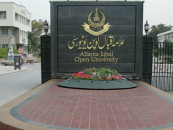Cash-for-work projects a success in flood-hit Sindh
Joint international and national entities replace charity with DIY cash initiatives.

Cash-for-work projects a success in flood-hit Sindh
As part of a unique initiative, various leading international organisations successfully executed various projects of disaster risk reduction in last year’s flood affected areas in Sindh on a community self help basis under a ‘cash for work program’ instead of merely dolling out money to the affected community as charity.
Through this initiative, international organisations including the World Food Program (WFP) and Save the Children (SC), with the help of Sindh Irrigation and Drainage Authority (SIDA) provided either Rs5,000 cash or food equivalent to this amount per month per family to 175,000 people in the worst flood-hit areas. Widespread and heavy rains caused renewed and devastating flooding across Sindh in August 2011.
Families work for community projects
Unlike charity, adult family members of the communities that were part of this initiative had to work for the identified projects in their community. Most of these projects were started in February this year and were completed by the end of June, before the start of the monsoon season. The initiative was taken in Sanghar, Mirpur Khas, Umerkot, Thatta, Tando Mohammad Khan and Badin districts.
the projects included repair and cleaning of tertiary and level four drains and irrigation canals, including their distributaries and watercourses. The second most important project was construction of elevated platforms where the villagers were able to take temporary refuge from high water levels in times of flooding.
SIDA engineers carried out surveys of the damaged drainage canals and prepared an estimation of the amount of work to be undertaken, man hours required and approximate completion time for each site. According to the SIDA the work entailed: rehabilitation of 39 minor irrigation channels measuring 197km, rehabilitation of 30 drainage channels measuring 102 km, and construction of 120 earth-filled raised platforms.
Partnership for social mobilisation
The report said this reconstruction required large scale social mobilisation of the affected communities. SIDA had limited experience of working directly with the community members, this project being a unique experience for them. Social mobilisation being paramount for success WFP entered into a partnership with SC to undertake this crucial task.
SC was tasked to initiate a social mobilisation campaign in the catchment areas of distributaries and drainage channels as well as raised platforms in order to disseminate the objectives of this project. A beneficiary’s identification criteria and the formation of a project implementation committees was also tasked to the SC. Eventually a tripartite arrangement was agreed among WFP, SIDA and SC for a joint implementation.
Cash transfer was the modality used for this intervention and WFP through the designated bank established a number of ‘Points of Sale’ at project sites for the release of cash to the workers. In this way, arrangements were finalized to deliver cash directly to the participating workers as close to the work sites as possible.
For the beneficiaries’ selection, WFP had developed the following criteria which SC used to mobilise the community, essentially engaging households affected by rain, flood, conflict or any other disasters; landless or poor households having two to four acres of land, share-croppers or tenants, households having an average monthly income of less than Rs6,000, households that lost their last crop season due to lack of agriculture inputs (seeds, fertiliser, etc) and households having lost livestock as their main source of income.
Vulnerable households
The households with some sort of vulnerabilities were not left out and they were provided unconditional support. Some of the beneficiaries, who did not possess computerised national identity cards, were provided with food baskets with equivalent value as cash. The households which were covered for vulnerabilities included: women/child-headed households, households with disabled, elderly or having no able-bodied earning members and households having unemployed family members.
To each community worker taking part in the activity, Rs5,000 was distributed on the completion of 15 days’ work. This payment was equivalent of the prevailing wage rate in the market for unskilled work.
By the end of June, this joint intervention was able to achieve a 100% completion of their planned targets.
Published in The Express Tribune, August 20th, 2012.



















COMMENTS
Comments are moderated and generally will be posted if they are on-topic and not abusive.
For more information, please see our Comments FAQ